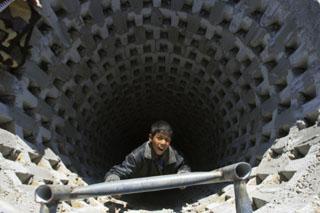 |
| A Palestinian boy looks up from the entrance of a smuggling tunnel on the Palestinian side of the border between the southern Gaza Strip and Egypt and Rafah in the south of Gaza Strip yesterday. During its offensive in the Gaza Strip, Israel said it destroyed most of the hundreds of tunnels in repeated bombing runs by Israeli jets. (Eyad Baba/Associated Press) |
Although Israel’s self-imposed cease-fire entered its third day yesterday, exchanges of fire continued on the ground.
Hamas fired eight mortar shells at the border crossings along the Gaza Strip-Kerem Shalom, Karni and Kissufim yesterday morning. Shortly afterward, two Israel Defense Forces’ (IDF) patrols along the fence came under fire from militants, on both south and north ends of the Gaza Strip. IDF combatants returned fire, and the Israeli Air Force (IAF) destroyed the mortar.

“They ran away from combat with us during the operation, and now they are trying to flex their muscles,” explained an officer in the Gaza Division. “The border crossings were not closed following the mortar shell fire, but this is not the reality that we want to live with.”

Lt. Col. Amir, commander of the 75th Armored Battalion, said yesterday “the battalion’s combatants were the first to go into Gaza.
AdSys ad not found for news/world:instory –>
A high level of vigilance remains on the ground, because you never know when you will be surprised. After we exposed a tunnel that was ready for a terror attack and a kidnapping in the style of the Gilad Shalit [kidnapping], we don’t have to explain too much to the
combatants,” Lt. Col. Amir said.

A senior security source said Israeli Defense Minister Ehud Barak personally gave authorization to attack and destroy the mortar that fired the eight shells due to the cease-fire.
“These are the first days of the cease-fire, and therefore we are not hurrying to draw conclusions,” the source said. “We will not permit by any means a game of ping pong along the Gaza Strip. As for pulling out the troops, we will only be guided by operational considerations.”

Meanwhile, sources close to director of the political security staff in the Israeli Defense Ministry expressed satisfaction with the progress forming an Egyptian mechanism for combating smuggling on Philadelphi Road.

Meanwhile, the western Negev is trying to return to normal. Eshkol Regional Council Chairman Haim Yellin said yesterday:
“On one hand, it’s good to get back to routine, but on the other hand, we have a lot of fears, because no agreement has been signed with the Palestinians. We have quiet due to the deterrence of the operation, but we are waiting for the next rocket. The question is how long this quiet will last.”

The education system in the south has returned to full activity, and sources in Beersheba reported 90-percent attendance of pupils on the first day of the return to school.
Amira Haim, director of the Education Ministry’s southern district, toured some of the schools and kindergartens and ensured that the teachers and pupils would receive reinforcements.
David Bedein can be reached at dbedein@israelbehindthenews.com







